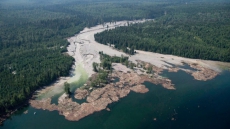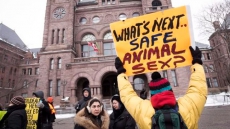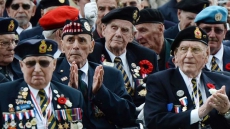RICHMOND, B.C. — On their third day in earthquake-stricken Nepal, a bus of volunteer firefighters wound around hills and hairpin turns on a makeshift single-lane road through rural villages pancaked by the disaster.
All along the 3.5-hour journey, children as young as four years old would scamper out of their “totally demolished” towns bearing curiosity and even smiles.
“They’ve got a kettle in their hands and a pot, they’re going to get water, and they’re waving to us saying ‘Hi’ like nothing is even affecting them,” said Lieut. Jeff Clark, as he emerged into the international arrivals area of Vancouver’s airport on Monday.
“It made us realize where we were at and how lucky we were to be in the position we were in.”
The team of unwashed but spirited men, including 22 firefighters from Burnaby and Mission, B.C., three doctors and three dogs, returned home to British Columbia after one week joining responders from around the globe in the intense search-and-rescue mission.
Co-ordinating the rescue of four hikers, including a Calgary woman and her friend from Australia, was a highlight among the devastation and futility they sometimes encountered in a country most members will remember for the stench of dead bodies.
Tamara McLeod, 24, was choppered out of a landslide in Langtang National Park, after the firefighters provided specific map co-ordinates obtained from a satellite phone, through a channel in Ottawa, to officials on the ground.
“We walked up to the lieutenant colonel and the major of the Nepalese army,” Clark recalled. “He says, ‘For you guys, no problem.'”
But along with the triumphs were many difficult moments.
Capt. Steve Leslie said the crew spent its final day in the 200-year-old historic district, west of the capital Kathmandu, attempting to help locals. He remembers people pleading for excavation, saying their family members were buried in the ruins of a seven-storey building.
The firefighters dug for more than two hours but found nothing.
“There were always emotions," said Leslie. "Feeling for the people. We came all that way to help the people. And sometimes the only way you could help them was to reassure them.”
The team was deployed to Nepal from B.C. within two days of the 7.8-magnitude quake, which has killed 7,300 people, injured thousands and left countless more missing. They were able to dispatch with lightning speed on account of a retired member who was already linked to international rescue efforts through the Canadian Medical Assistance Team.
Canada’s Disaster Assistance Response Team, known as DART, deployed on Saturday, nearly a week later.
“Our members are volunteers, so it’s different. They can go when they want,” said Burnaby Fire Chief Doug McDonald. “There’s no government-encompassing decisions that are made.”
Upon arrival, the team set up at the United Nations’ Urban Search and Rescue Camp adjoining the Kathmandu airport, with more than 4,000 other rescuers assembled from around the world. They took directions from the global body, which provided them a sector to search, along with local military personnel and an interpreter.
The team and the sniffer dogs conducted thorough assessments of buildings in its zone and marked rubble they believed to be concealing piles of bodies. The Nepalese army will carry out the removals.





